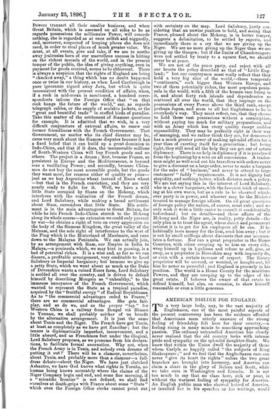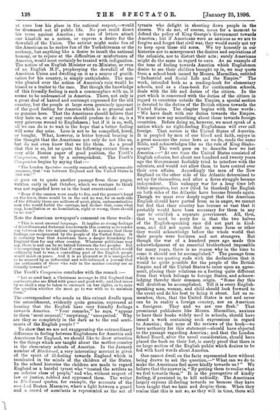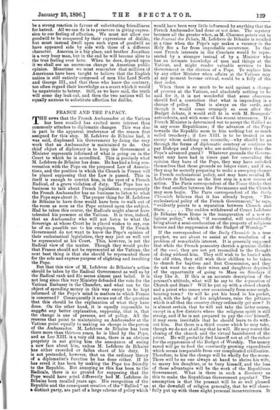AMERICAN DISLIKE FOR ENGLAND.
TO a very large body, nay, to the vast majority of Englishmen, one of the most painful aspects of the present controversy has been the evidence afforded that Americans seem utterly unaware of the strong feeling of friendship felt here for their country,—a feeling rising in many minds to something approaching passion. The ordinary untravelled American has clearly never realised that the old country looks with intense pride and sympathy on the splendid daughter-State. We know that within the Union dwell the majority of those whom Carlyle so happily called " the subjects of King Shakespeare ;" and we feel that the Anglo-Saxon race can never " give its heart its rights " unless the two great branches are brought into harmony, and America can claim a share in the glory of Nelson and Scott, while we take ours in Washington and Lincoln. It is not too much to say that no class here, rich or poor, is without the warmest feeling of sympathy for America. An English public man who showed hatred of America, or insulted her in his speeches or his writings, would at once lose his place in the national respect,—would be drummed out of public life. No poet could direct his verse against America ; no man of letters attack our kinsfolk as a nation, or express a desire for the downfall of the Union. The satirist might make fun of the American as he makes fun of the Yorkshireman or the cockney, but anything like a desire to insult the national honour, or to rejoice at the difficulties or misfortunes of America, would most certainly be treated with indignation. The notion of an English Minister or ex-Minister, or even of an English M.P., prophesying the downfall of the American Union and dwelling on it as a source of gratifi- cation for his country, is simply unthinkable. The man who gloated over the notion of America's ruin would be hissed as a traitor to the race. But though the knowledge of this friendly feeling is such a commonplace with us, it seems to be undreamt-of in America. There, not only is a great deal of hatred and contempt expressed for the old country, but the people at large seem genuinely ignorant of the good feeling for America, which is so general and so genuine here. That the Americans should believe that they hate us, or at any rate should profess to do so, is a very grievous wound to Englishmen ; but if it is so, well, all we can do is to wait in the hope that a better feeling will some day arise. Love is not to be compelled, hired, -or bought. What, however, is bitter beyond bearing is the thought that the Americans not only do not like us, but do not even know that we like them. As a proof that this is so, let us quote the following extract from a very able Boston paper of good position, the Youth's Companion, sent us by a correspondent. The Youth's Companion begins by saying that :— "The London Spectator recently remarked, with epigrammatic erseness, that . war between England and the United States is ;ivil war.' " It goes on to quote another passage from these pages, written early in last October, which we venture to think was not regarded here as in the least overstrained :- "Even if the cannon were ready to fire, and the gunner's hand on the lever, there would be in the end no war, for on each side of the Atlantic there are millions of quiet, plain, undemonstrative men who would forbid the outrage, and declare that, come what may, humiliation or no humiliation, right or wrong, there should be no war."
Note the American newspaper's comment on these words : "This is most unusual language. It implies so strong feelings of friendliness and fraternal love towards this country as to render war between the two nations impossible. It assumes that these 'feelings are reciprocated by the people of the United States. It is certainly true that Americans have a deeper friendship for England than for any other country. Whatever politicians may say, there is and can be no hatred between the two peoples But it is surprising to be told that if events were to occur which would ordinarily lead to war, a controlling part of the English people would insist on peace. And it is as pleasant as it is unexpected to be assured by so influential and well-informed a journal that the sentiments of those who rule in the mother country are so friendly toward us."
The Youth's Companion concludes with the remark :- " Let us send back a Christmas message to Old England that our hearts also are filled with peace and good-will ; and that never by us shall a step be taken to encroach on her rights, or to raise the question whether she must go to war with us to maintain them."
The correspondent who sends us this extract dwells upon the astonishment, evidently quite genuine, expressed at hearing that the English have very friendly feelings towards America. " Your remarks," he says, " appear -to them most unusual,' surprising," unexpected.' Why -are they so completely in the dark as to the real senti- ments of the English people ? "
To show that we are not exaggerating the extraordinary 'difference in feeling between Englishmen for America and Americans for England, we should like to draw attention to the things which are taught about the mother-country in the elementary schools of America. In the January number of Blackwood, a very interesting account is given of the spirit of ill-feeling towards England which is inculcated in the minds of the children of the States. In the school histories the children are made to regard England as a hateful tyrant who "treated the settlers as an inferior class of people," and who, without respect of law or justice, robbed and oppressed them. The writer in Blackwood quotes, for example, the accounts of the so-cd:ed Boston Massacre, where a fight between a guard and a crowd of assailants is represented as the act of tyrants who delight in shooting down people in the streets. We do not, of course, mean for a moment to defend the policy of King George's Government towards America ; but if Americans were as anxious as we are to forgive and forget that civil war, they would surely not try to keep open these old sores. We try honestly in our histories not to misrepresent the desires and aspirations of the colonists, nor to distort their acts ; surely Americans might do the same in regard to ours. As an example of the tone of feeling towards America which Englishmen desire to see their children brought up in, we may quote from a school-book issued by Messrs. Macmillan, entitled " Industrial and Social Life and the Empire." The work, intended both as a reading-book for elementary schools, and as a class-book for continuation schools, deals with the life and duties of the citizen. In the part which is concerned with the duties of the citizen in regard to countries outside the Empire, a special section is devoted to the duties of the British citizen towards the United States. The chapter begins with these words : " We have dealt with our duties towards the Empire. We must now say something about those towards foreign countries. Before doing so, however, we must speak of a nation which no right-feeling Englishman will ever call foreign. That nation is the United States of America. It is peopled by men of our blood and faith, enjoys in a great measure the same laws as we do, reads the same Bible, and acknowledges like us the rule of King Shake- speare." The work goes on to describe how we lost America :—" At one time the United States consisted of English colonies, but about one hundred and twenty years ago the Government foolishly tried to interfere with the colonists, and would not allow them to have control over their own affairs. Accordingly the men of the New England on the other side of the Atlantic determined to set up for themselves, and after a fierce struggle became independent. This unhappy war for a long time left bitter memories, but now (God be thanked) the English on both sides of the Atlantic have become friends again. Though we must ever deeply regret that the American English should have parted from us in anger, we cannot but feel that their country has become so vast that it probably would have been necessary for them in any case to establish a separate government. All, then, that we need be sorry for is that the two halves of the English-speaking race did not part in kind- ness, and did not agree that in some form or other they would acknowledge before the whole world that their people were brethren and not strangers. But though the war of a hundred years ago made this acknowledgment of an essential brotherhood impossible for many years, there is no reason why in the time to come it should not be accomplished." The passage from which we are quoting ends with the declaration that it would be quite possible for the people of the British Empire and of the United States to enter upon an agree- ment, placing their relations on a footing quite different from that which belongs to foreign States, and acknow- ledging thereby their common origin. " Some day this will doubtless be accomplished. Till it is every English- speaking man, woman, and child should look forward to the event and do his best to bring it about. Let us re- member, then, that the United States is not and never can be in reality a foreign country, nor an American a foreigner. They and we are one flesh." That prominent publishers like Messrs. Macmillan, anxious to have their books widely used in schools, should have issued a work containing such expressions in regard to America; that none of the reviews of the book—we have authority for this statement—should have objected to the passage regarding America; and that the London School Board, after the usual consideration, should have placed the book on their list, is surely proof that there is no large section of the English public which desires to be fed with hard words about America.
One cannot dwell on the facts represented here without being drawn to ask the question,—" What can we do to make the Americans feel more kindly towards us ? " We believe that the answer is, "By getting them to realise what we feel towards them." It is the prerogative of kindly feeling, if persisted in, to kill unkindly. The Americans largely express ill-feeling towards us because they have been taught that we hate and despise them. When they realise that this is not so, as they will in time, there will be a strong reaction in favour of substituting friendliness for hatred. All we can do is to persevere in giving expres- sion to our feeling of affection. We must not allow our goodwill to be conquered by their expressions of dislike, but must instead dwell upon such signs of goodwill as have appeared side by side with those of a different character. America is a big place, and brother Jonathan is a very busy man, but in the end he will become alive to the true feeling over here. When he does, depend upon it we shall see an enormous change in American public opinion. Meantime we must remember that millions of Americans have been taught to believe that the English nation is still entirely composed of men like Lord North and George III., and that those who know the contrary, too often regard their knowledge as a secret which it would be unpatriotic to betray. Still, as we have said, the truth will some day leak out, and then the two nations will be equally anxious to substitute affection for dislike.




















































 Previous page
Previous page